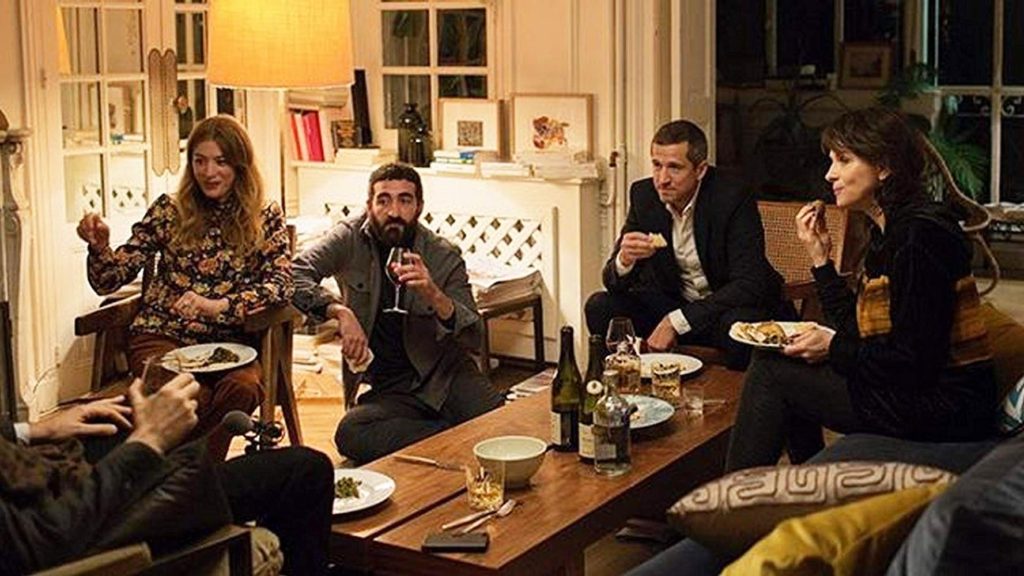Original French Title: Doubles Vies
Director: Olivier Assayas
This movie is, in a word, "French." A friend of mine has the belief that all French movies are 15 minutes too long, and Non-Fiction proves his point with gusto. It's compelling enough for most of its length, but then really takes an odd turn that undercuts many of the strengths of the first hour and a half.
The movie follows the lives of several French people, most involved in the literature business, politics, or acting. Their lives intersect in various ways: friendships, business and romantic relationships, the latter being through marriage or infidelity. As they meet and interact with each other, whether in pairs or larger groups, they discuss their relationships and their professional lives. Among the several professional themes, the primary one is that of the place and nature of novels in the modern world. One character, Leonard Spiegel (Vincent Macaigne), is an author of modest success who has come under repeated criticism for his use of thinly-veiled autobiographical relationships in his works of "fiction." His attempts to explain this to his wife and occasional mistress keeps him in hot water, all while he and his publisher reckon with the fact that physical books are a slowly-dying industry.
The movie is compelling enough to viewers like my wife and I - people who enjoy good literature and the arts to an extent. For much of the film, the characters hash out some of the complexities involved in those fields, and it does it all with a fair amount of heart and humor.
But things become a bit too light and breezy by film's end. And the final ten minutes are almost baffling in their frivolity with not only the story but the entire nature of the film itself. There's a "meta" moment that is so clumsy and unimaginative that it renders nearly any weight that the film had previously carried useless. And despite the compelling romantic strife throughout the story, things end on a bizarrely sappy note.
Perhaps I was missing something. Maybe there was some wrinkle of satire or irony that I wasn't picking up, but the film's end really weakened so much of the rest of it. While I've only seen one of the director's other film - the absolutely brilliant The Clouds of Sils Maria - I was hoping for something a bit better. Despite strong acting and some intriguing intellectual subject matter, this one really dropped the ball at the end.
All that said, it was a fairly amusing movie. It sets up as a mostly light, humorous ensemble tale about artists in a changing modern landscape. I enjoyed it well enough for the most part, though I'll never feel the need to watch it again.
Director: Olivier Assayas
This movie is, in a word, "French." A friend of mine has the belief that all French movies are 15 minutes too long, and Non-Fiction proves his point with gusto. It's compelling enough for most of its length, but then really takes an odd turn that undercuts many of the strengths of the first hour and a half.
The movie follows the lives of several French people, most involved in the literature business, politics, or acting. Their lives intersect in various ways: friendships, business and romantic relationships, the latter being through marriage or infidelity. As they meet and interact with each other, whether in pairs or larger groups, they discuss their relationships and their professional lives. Among the several professional themes, the primary one is that of the place and nature of novels in the modern world. One character, Leonard Spiegel (Vincent Macaigne), is an author of modest success who has come under repeated criticism for his use of thinly-veiled autobiographical relationships in his works of "fiction." His attempts to explain this to his wife and occasional mistress keeps him in hot water, all while he and his publisher reckon with the fact that physical books are a slowly-dying industry.
The movie is compelling enough to viewers like my wife and I - people who enjoy good literature and the arts to an extent. For much of the film, the characters hash out some of the complexities involved in those fields, and it does it all with a fair amount of heart and humor.
 |
| Expect plenty of conversations involving talented intellectuals, wine, good food, and the smoking of cigarettes. In other words, expect a French movie. |
Perhaps I was missing something. Maybe there was some wrinkle of satire or irony that I wasn't picking up, but the film's end really weakened so much of the rest of it. While I've only seen one of the director's other film - the absolutely brilliant The Clouds of Sils Maria - I was hoping for something a bit better. Despite strong acting and some intriguing intellectual subject matter, this one really dropped the ball at the end.
All that said, it was a fairly amusing movie. It sets up as a mostly light, humorous ensemble tale about artists in a changing modern landscape. I enjoyed it well enough for the most part, though I'll never feel the need to watch it again.

No comments:
Post a Comment